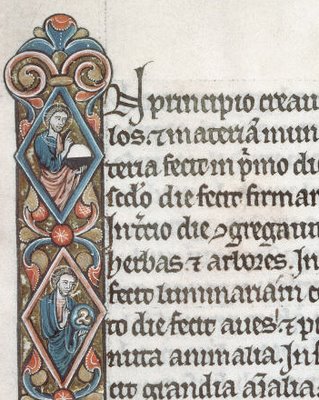From the Epistle for the Sunday in Sexagesima: "For though I should have a mind to glory, I shall not be foolish: for I will say the truth: but I forbear, lest any man should think of me above that which he seeth in me, or anything he heareth from me. And lest the greatness of the revelations should exalt me, there was given me a sting of my flesh, and angel of Satan, to buffet me. For which thing, thrice I besought the Lord that it might depart from me. And He said to me: my grace is sufficient for thee: for power is made perfect in infirmity. Gladly therefore will I glory in my infirmities, that the power of Christ may dwell in me." (II Cor. xii, 6-9)
When [St. Anselm] was torn from the solitude of the studious life of the cloister, to be raised to a lofty dignity in most difficult times, he found himself a prey to the most tormenting solicitude and anxiety, and chief of all the fear that he might not do enough for the salvation of his own soul and the souls of his people, for the honor of God and of His Church. But amid all these anxieties and in the grief he felt at seeing himself abandoned culpably by many, even including his brethren in the episcopate, his one great comfort was his trust in God and in the Apostolic See. Threatened with shipwreck, and while the storm raged round him, he took refuge in the bosom of the Church, his Mother, invoking from the Roman Pontiff pitiful and prompt aid and comfort; God, perhaps, permitted that this great man, full of wisdom and sanctity as he was, should suffer such heavy tribulation, in order that he might be a comfort and an example to us in the greatest difficulties and trials of the pastoral ministry, and that the sentence of Paul might be realized in each one of us: "Gladly will I glory in my infirmities that the power of Christ may dwell in me. For which cause I please myself in my infirmities . . . for when I am weak then am I powerful" (2 Cor. xii. 9, 10).
Such indeed are the sentiments which Anselm expressed to Urban II.: "Holy Father, I am grieved that I am not what I was, grieved to be a bishop, because by reason of my sins I do not perform the office of a bishop. While I was in a lowly position, I seemed to be doing something; set in a lofty place, burdened by an immense weight, I gain no fruit for myself, and am of no use to anybody. I give way beneath the burden because I am incredibly poor in the strength, virtue, zeal, and knowledge necessary for so great an office. I would fain flee from the insupportable anxiety and leave the burden behind me, but, on the other hand, I fear to offend God. The fear of God obliged me to accept it, the same fear of God constrains me to retain the same burden. Now, since God's will is hidden from me, and I know not what to do, I wander about in sighs, and know not how to put an end to it all".



